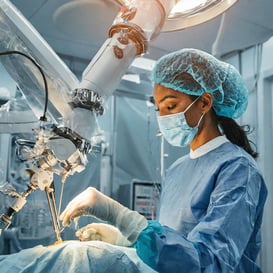Precision Oncology: How Robotic Systems are Transforming Cancer Surgery
Cancer surgery has come a long way in recent decades, moving towards more precise, minimally-invasive procedures that can offer better outcomes for patients. A key driver of this transformation has been the increasing adoption of robotic surgical systems, which are revolutionizing how complex oncological procedures are performed.
Precision is paramount in cancer surgery, as surgeons must carefully remove tumors while sparing surrounding healthy tissue. Robotic platforms like the da Vinci Surgical System provide surgeons with enhanced dexterity, 3D visualization, and tremor filtration - capabilities that enable them to operate with a level of accuracy and control that was previously unattainable.
These robotic systems utilize miniaturized, articulating instruments that can access hard-to-reach anatomical sites through tiny incisions. This minimally-invasive approach can lead to reduced blood loss, shorter hospital stays, and faster patient recovery times compared to open surgeries. Robotic techniques have been successfully applied to a wide range of oncological procedures, including prostatectomies, hysterectomies, lung resections, and colorectal cancer surgeries.
instruments that can access hard-to-reach anatomical sites through tiny incisions. This minimally-invasive approach can lead to reduced blood loss, shorter hospital stays, and faster patient recovery times compared to open surgeries. Robotic techniques have been successfully applied to a wide range of oncological procedures, including prostatectomies, hysterectomies, lung resections, and colorectal cancer surgeries.
Beyond the physical benefits, robotic platforms also offer valuable data-gathering capabilities that can feed back into the precision oncology paradigm. Onboard sensors and imaging systems can provide surgeons with real-time, high-resolution visualization of the surgical site, allowing them to more easily identify tumor margins and critical anatomical structures. This information can then be integrated with pre-operative patient scans and used to plan the optimal surgical approach.
 Additionally, the detailed procedural data captured by robotic systems can be analyzed to identify surgical patterns and techniques that correlate with the best patient outcomes. By studying this data, medical teams can continuously refine and improve robotic oncological procedures, creating a feedback loop that enhances precision and safety.
Additionally, the detailed procedural data captured by robotic systems can be analyzed to identify surgical patterns and techniques that correlate with the best patient outcomes. By studying this data, medical teams can continuously refine and improve robotic oncological procedures, creating a feedback loop that enhances precision and safety.
Companies like Boston Engineering, with deep expertise in medical device development and robotics, have the capability to drive forward the next generation of robotic surgical systems. Their engineers possess the technical know-how to develop platforms that are smaller, more dexterous, and capable of even greater precision than current offerings. Through collaborative R&D efforts with hospitals, universities, and other partners, Boston Engineering can leverage its cross-disciplinary skills to push the boundaries of what is possible in robotic-assisted cancer surgery. By integrating advanced sensors, controls, and imaging capabilities, the company's innovations have the potential to further enhance the precision and efficacy of oncological procedures, ultimately improving outcomes for patients battling this devastating disease.
As precision oncology continues to evolve, robotic surgical platforms will undoubtedly become an increasingly integral part of the cancer treatment toolkit. By empowering surgeons with enhanced capabilities, these systems are transforming the landscape of oncological procedures - offering patients more hope for positive outcomes in the fight against this devastating disease.
For almost three decades, Boston Engineering has designed, developed, and optimized devices and technologies the medical community relies on to save lives, enrich quality of life, and reduce costs to the healthcare system. We provide solutions to the challenges in the adoption of surgical robotics.
Our expertise includes industrial design and product redesign, sensors and control systems, robotics technical innovation, and digital software solutions.
Imagine your Impact: Stay up-to-date with the latest insights and trends we're watching. Add your email address below and sign up for a monthly summary of our most impactful posts!









.jpg)


